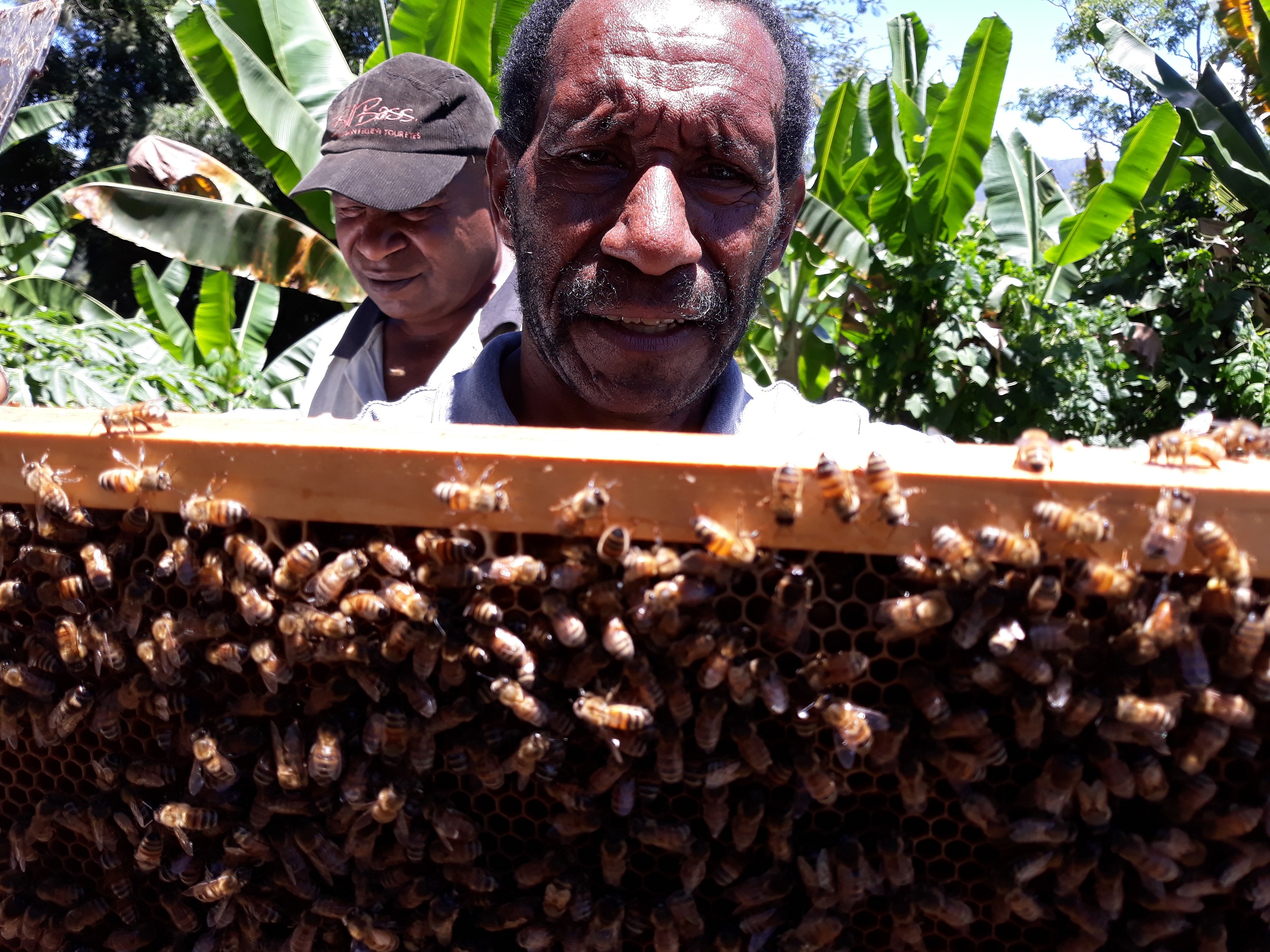Image: Samuel Kuku, a beekeeper in the Eastern Highlands.
For more than 30 years, Tella Loie, worked in the public service as a honeybee specialist.
His entire career was dedicated to building the capacity of beekeepers in the Eastern Highlands. While he was presented with opportunities to go into business, he turned them down and continued to help beekeepers in the Eastern Highlands.
In 2016, Tella Loie quit the public service and, in an old government warehouse, he started a small business.
“The opportunities have always been there,” he said. “But I couldn’t take advantage of it because I was a government worker.
“What dreams I had, slowly began to come out…everything that was in me in being put into creating more opportunities for bee farmers.”
With costs rising, it has been difficult for bee farmers who import beehives from New Zealand.
Taking his 38 years of beekeeping and management experience, Mr. Loie is now helping farmers reduce their equipment costs.
Tella Loie, a beekeeper in the Eastern Highlands has spent over three decades in the beekeeping industry.In Goroka, he is singlehandedly reducing the need for imports by making beehives and repairing honey trays used by bees to create honeycombs. This month alone, his small team of workers made over 100 beehives from local timber.
“Being Papua New Guineans, we all have our challenges. The question we should be asking is what can I do to help my country in terms of development…in terms of employment for our people?
“I am happy because at least in a little way, I’m contributing positively to my people and my country despite receiving no support from the government.”
Tella Loie is one of a handful of self-taught beekeeping experts in Papua New Guinea. He says the risk of losing this knowledge is increasing as others like him grow older.
“There are other very resourceful people in the public service who have received training and are keen to do work in the communities. But without funding and resources, all their dreams and aspirations remain in them.
“Then, one day they will go.
“Honey is yellow gold. It’s just waiting for someone to collect it.”
Outside of Goroka, another beekeeper, Samuel Kuku, shows how honey is harvested. Mr. Kuku has honed his beekeeping skills over the last 10 years and is now an authority on honey production.
Recently, one of his hives produced record volumes.
“It is a joy for me when I harvest the honey,” he laughs. “I think the bees are very happy with me.
“I was featured in the National Newspaper for my honey trays that weighed seven kilograms each. What they didn’t feature was another one that weighed eight kilograms. That is quite rare.”
For those in the know, the average weight of a honey tray when harvested is anything between three and four kilograms.
Samuel Kuku, a beekeeper.Samuel Kuku’s income from honey alone has risen in the last three years; in 2017, he made K18,000. For a farmer with kids in university including a son studying for a science degree in agriculture, it is important income.
In the Eastern Highlands, beekeepers are a close-knit community of friends.
Samuel was introduced to beekeeping by the Chairman of the Bee Keepers Association of the Eastern Highlands, Jonah Buka.
Like Tella Loie, Mr. Buka is keen to see honey production grow in the Eastern Highlands. For him, beekeeping is not just a job, it is a passion, an art and a lesson in coexistence.
“Make sure you ‘smoke’ them first so they move out of the way,” he explains as he pumps smoke onto the bees.
The smoker is a tool used to pacify the bees before harvesting.
“Never kill the bees. Honey is their food. We are, in fact, taking their food. So we have to be kind. When we harvest, there has to be one tray left so they feed on it when there is rain and no nectar in the flowers.
“We don’t own them. They live here.”
Comparatively, honey is worth more per kilogram than coffee. Currently, the average price is K13 per kilogram – close to three times the price of coffee.
Honey producers like, Tella Loie and Jonah Buka say that if the same support given to coffee was given to honey production, PNG’s export revenue could reach unprecedented levels.


